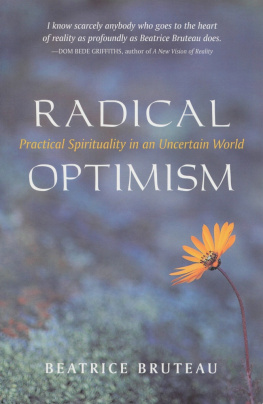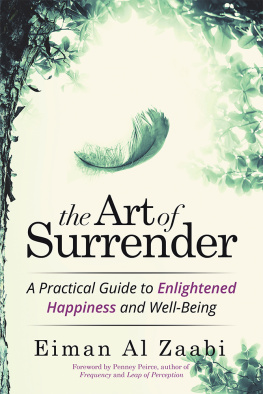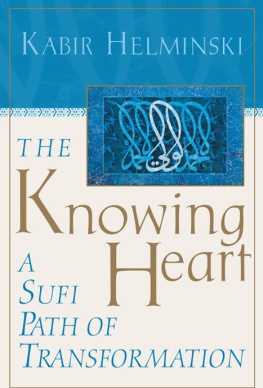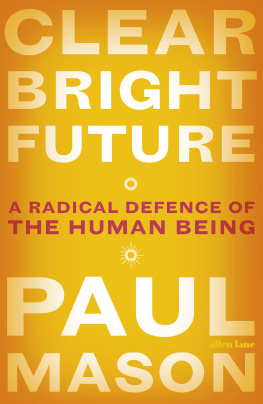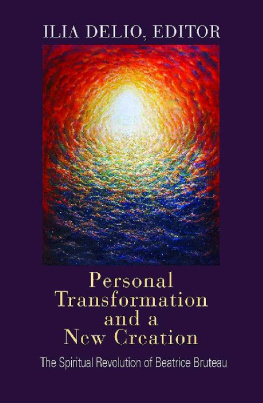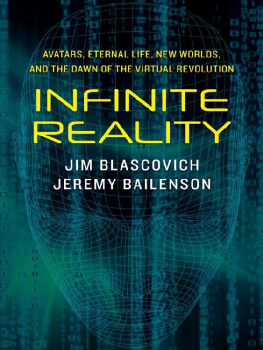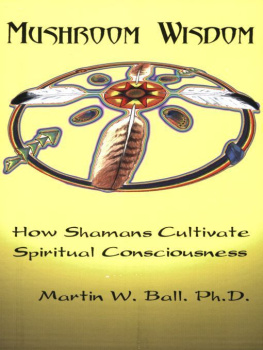Radical Optimism
RADICAL OPTIMISM

Practical Spirituality in an Uncertain World

BEATRICE BRUTEAU

Copyright 1993, 2002 by Beatrice Bruteau
All rights reserved. This book, or parts thereof, may not be reproduced in any form without permission, except in the case of brief quotations embodied in critical articles and reviews.
Cover design by Kim Johansen, Black Dog Design
Library of Congress Cataloging-in-Publication Data available at the Library of Congress
Printing History
First published by Crossroad Publishing Company, New York, 1996
Sentient edition 2002
Second Sentient printing 2004
1 0 9 8 7 6 5 4 3 2
SENTIENT PUBLICATIONS
A Limited Liability Company
1113 Spruce Street
Boulder, CO 80302
www.sentientpublications.com
Contents
Acknowledgments
The author and publisher gratefully acknowledge permission to reprint portions of this text which were previously published:
, "The Finite and the Infinite," appeared in The Quest: A Quarterly Journal of Philosophy, Science, Religion & the Arts 2/2 (Summer 1989): 6473.
Portions of , "Heart of Jesus, Root of Reality," appeared in the articles "Entering the Heart of Jesus," Cistercian Studies 20 (1985): 11630, and "In the Cave of the Heart: Silence and Realization," New Blackfriars 65 (July/ August 1984): 30119.
, "Trinitarian Manifestation," appeared in Cistercian Studies Quarterly 24 (1989): 95104, under the title "Trinitarian World."
Preface to the Second Edition
The more troubled and difficult the world becomes, the more important it becomes to be optimistic. And the more deeply we need to root our optimism. When we cannot reasonably base it on the way things are going, we know that we have to base it in the ultimate reality of God. We know that it has to be radical.
Pierre Teilhard de Chardin said that we will not make the effort that is necessary to move us to the next stage of evolution, to form the world of the noosphere, the hyperpersonal, the world of global peace and friendship and prosperity, unless we believe it has a very good chance of succeeding. We need to be optimistic. Visions of utopias have a place in our thoughts and in our efforts because they activate the ideas and the desires that move us in those directions. In our personal lives and concerns, optimism makes a big difference, measurably improving our health and career success.
Mattie J.T. Stepanek, author of Journey through Heartsongs, says that "positive attitudes" impel us "towards the journey for world peace. And world peace, harmony, and confidence are essential for our future" [Poem 13]. Without confidence we may not have a future. And anyway, without confidence, who has the heart to go forward in living and to enjoy living? Confidence, optimism, is fundamentally necessary to true pleasure and happiness, to improvements, and to life itself.
This book is about a way of obtaining this radical optimism by means of contemplation. Contemplation means withdrawing attention from outward, objective, particular, and temporal concerns, and refocusing on inward, subjective, general and even eternal realities. This transcendent standpoint brings us into a deeper place with surer values and a more authentic selfhood. From this place we are also better able to deal with the temporal and particular. Essential to both the inward movement and the outward movement is an orientation we may call "purity of heart." Contemplation is not just an intellectual activity. It is also a moral and a devotional matter. Unless we have freed ourselves of violence, anger, vengefulness and vindictiveness, we will not be able to retire within. Unless we have detached from lust, greed, envy, and covetousness, we will not be able to refocus on the transcendent level. Unless we are energized by yearning for the divine as the Real and are willing to be embedded in it rather than making use of it, we will never find it.
People who are long-term practitioners of contemplation characteristically drop one local self-identification after another. They no longer see their personal reality limited to membership in this group rather than that. The whole truth about them is not summed up by a recital of what sex, race, nation, religion, social stratum they belong to. They experience themselves as being more real at a level that transcends all these classifications, and they simultaneously see other people at the same level of commonality. This view inevitably makes for peaceful and supportive relationships.
It is in this sense that contemplation necessarily involves metaphysics. Metaphysics is not an item in a New Age agenda but a branch of philosophy that studies what all beings have in common. It is the most general science. This is why the contemplative, after learning to quiet the mind sufficiently to withdraw it from the concerns of everyday particularity, focuses on the most far-reaching questions: the relation of the finite to the infinite, of the contingent to the necessary, of the temporal to the eternal. And, of these pairs themselves, we ask whether they are ineluctably polarized with respect to one another or whether they can be united in some way.
This metaphysical exploration is carried on in this book by means of familiar religious metaphors that invite the practicing contemplative to enter into a subjective perspective in which something universal can be seen. For instance, the meditation on "the heart of Jesus" is an exercise to help the meditator center into the core of Being, where both the infinite (divinity) and the finite (humanity) can be found in mutual indwelling. This kind of practice is proposed because the crucial transition in the contemplative process is not so much in what is seen as in the position from which it is seen. The subjective sense of existing shifts its "location" from a particular intersection of finite and contingent classes to the transcendent level of the infinite, necessary, and eternal. This is why the book concludes with the contemplation of "the communion of the saints," a deep awareness of the absolute universality of kinship among all those that are.
Contemplation thus both has a value in its own right, gaining insight into the nature of reality at its ultimate depth, and is fundamentally useful in dealing with our worldly problems. When we reach an impasse with some entity we are obliged to interact with, the only thing to do is back off and achieve a new perspective from a level transcendent to the problem level. When you do not identify with either of the adversaries, you can often see what assumptions are being made by each partyand sometimes by both. A situation of impasse is usually an indication that something is amiss with the assumptions. The contemplative practice can bring to consciousness what we have been taking for granted unconsciously. Once these assumptions have been exposed, theycan be studied and reevaluated. Then a new effort can be made at resolving the problem. This can be a breakthrough experience for populations moving out of a worldview in which they believed themselves necessarily subject to some elite (based on assumptions about sex, race, wealth, religion, etc.). It is called for in all multi-cultural situations. It is relevant to any apparent "clash of civilizations." It is worth trying even in apparently irreconcilable quarrels over admittedly limited resources (such as the same piece of territory). When we seek the common ground, the more basic humanly shared values, we at least put ourselves in a more creative position for finding new approaches.

